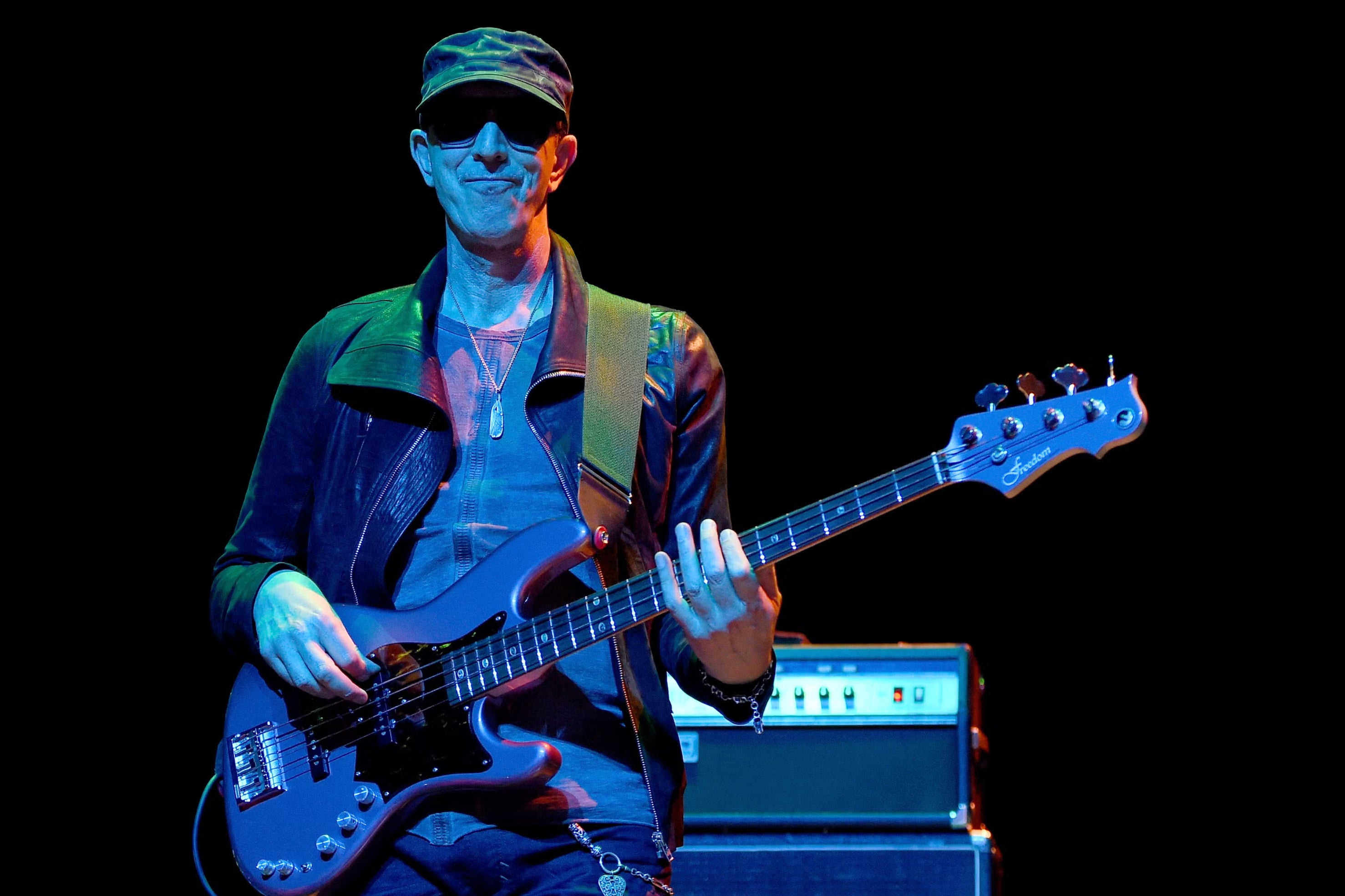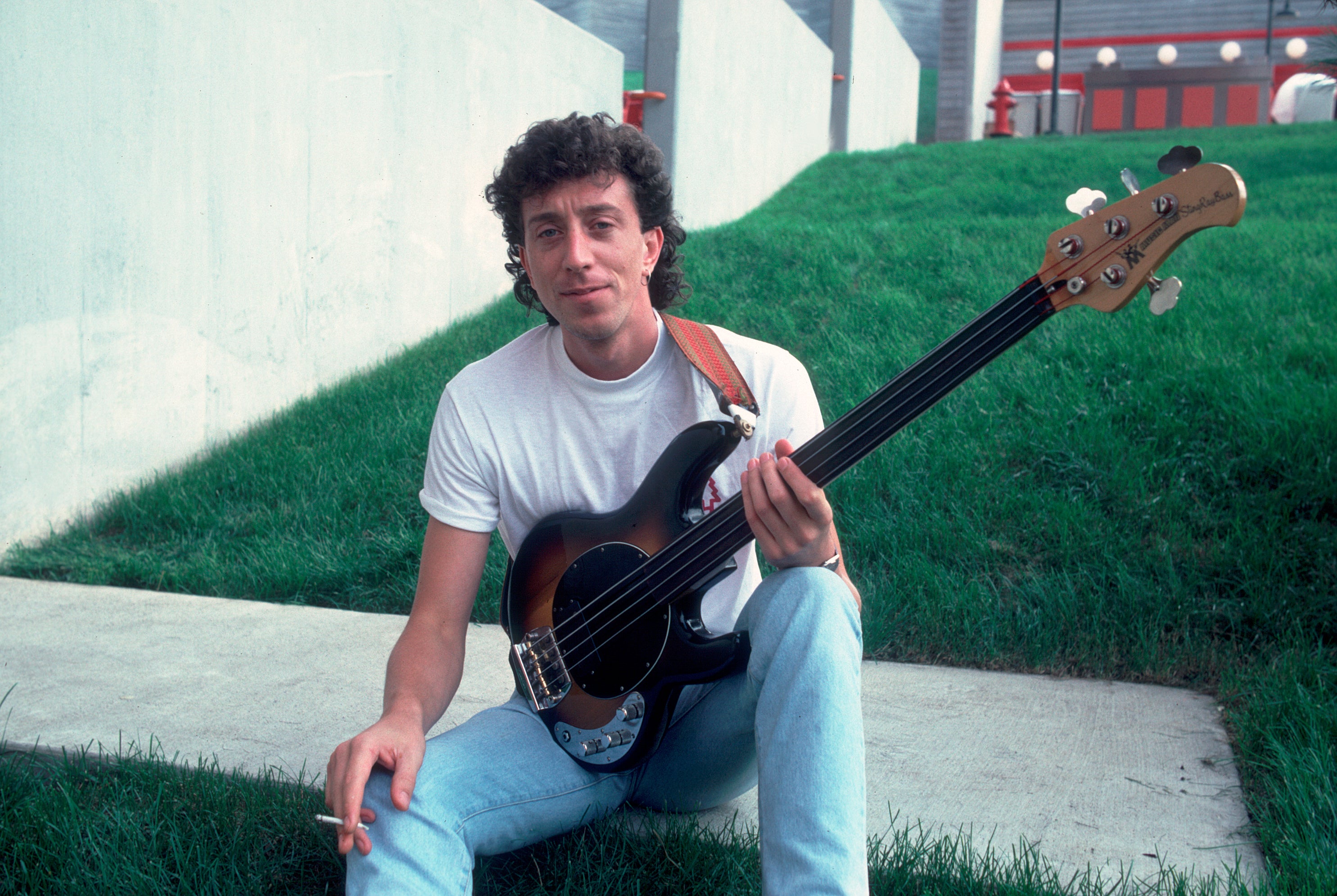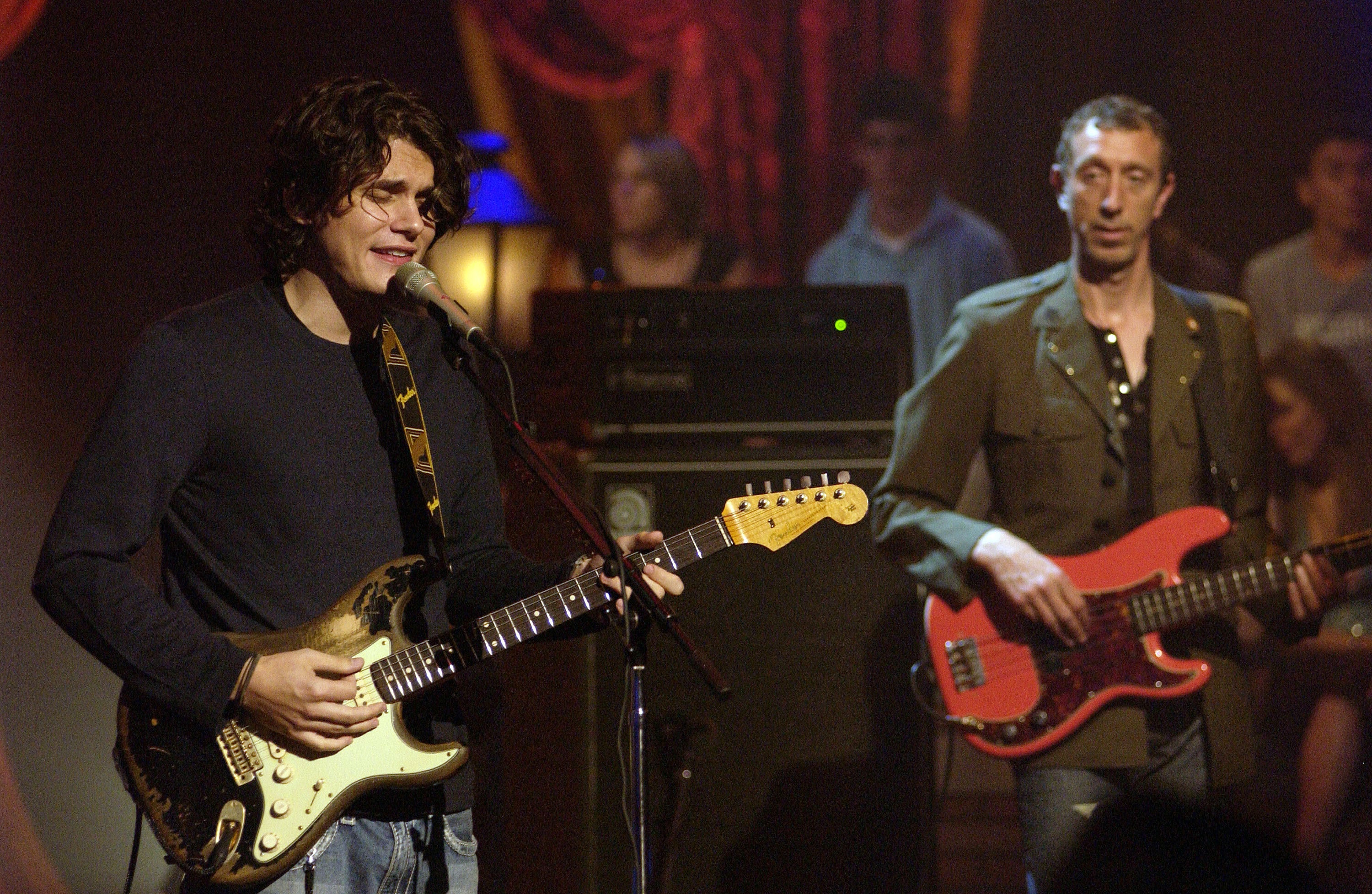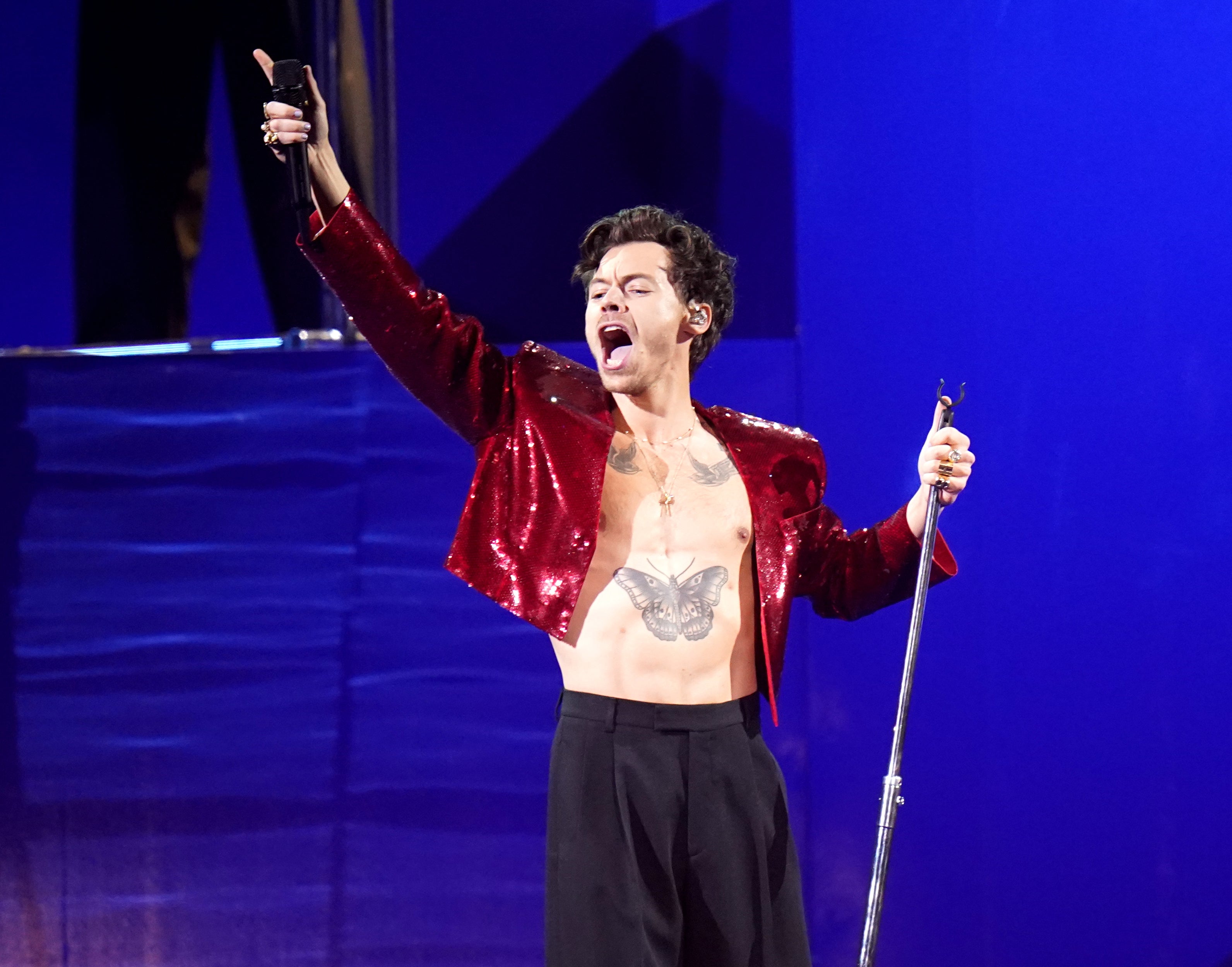He’s worked with everyone from The Who to Harry Styles – meet the world’s most in-demand bassist
From Gary Numan to Phil Collins, The Who, Paul Simon, Elton, Adele, Harry Styles and Beyoncé, the bassist’s career is a who’s who of music. Jude Rogers finds out how he went from folk to funk to pop

The 66-year-old Welshman on my Zoom call, gazing kindly through oversized fashionable glasses, remembers a phone call that led to him playing on the 21st century’s biggest-selling LP. “The voice said, ‘It’s Rick Rubin’ – I didn’t know him at all, so I was quite chuffed to get the call.” The top US music producer, he learnt, “was a fan of my work, and he was doing an album with a young British artist”.
In the early afternoon Los Angeles sunshine, Pino Palladino’s Cardiff lilt has clear, salty waves of American twang. “So I met her, and her dad was from down the road from me in Penarth! She’s a good laugh, Adele… [And] as she sang, I remember just thinking, wow.” That record was 21, and Palladino, the bassist on four of its tracks, is one of the humblest, most prolific and versatile bass players of the past four decades.
Whatever your age or tastes, you’ll have heard him. In the Eighties, he popularised the soulful, lead fretless bass sound on huge hits like Paul Young’s version of Marvin Gaye’s “Wherever I Lay My Hat (That’s My Home)” and Phil Collins’s “I Wish It Would Rain Down”. Later, he became a beloved collaborator of US R&B royalty D’Angelo and Common, a right-hand-man of bluesy singer-songwriter John Mayer and king of stadium-sized industrial noise, Nine Inch Nails’ Trent Reznor. He was also the last-minute stand-in for The Who’s bassist John Entwistle, a few nights after he died suddenly, on their US tour, in 2002. “I got through that first gig at the Hollywood Bowl by the skin of my teeth,” Palladino remembers. “Then ended up touring with the band off and on for – how long was it?” – he counts in his head – “14, 15 years.”
Ed Sheeran described him as the “Welsh dude who is widely known as being the best bassist in the world” when constructing his fantasy band for The Independent. He’s gone mega-pop in recent years, playing on Beyoncé and Miley Cyrus’s “II Most Wanted”, Sheeran’s “Castle on the Hill” and Harry Styles’s “Watermelon Sugar”, the chorus to the latter a masterclass in Palladino’s spry, subtle funk. Although he now lives in Los Angeles – it saves flying 6,000 miles for sessions, he explains, and “the weather’s a bit better” – this month he returns to his hometown to perform his first show under his name in 30 years, as part of the Welsh capital’s celebration of musical innovation, the Cardiff Music City Festival.
Born in 1957 to a Welsh mother, Ann, and an Italian father, Umberto, who migrated to work in the steel industry before running restaurants across the city (one of which, Pizzeria Villagio, is still run by Pino’s brother, Marc), Palladino had many musical epiphanies in his Cardiff childhood. The first came at his Catholic primary school after he was asked to carry a banner in a procession. “Mainly because I was really tall! But I got to walk right next to the marching band, to the snare drums and bass drums. I remember thinking, ‘Oh, my God, what an incredible sound, I want to be part of that.’”
At “11 or 12”, he loved going with his family to Cardiff dinner-and-dancing restaurant, The Victoriana, watching its resident jazz trio from a booth as his siblings ate and his parents danced. At 14, he was taught folk songs at school, “pinched” his sister’s guitar, and got into Simon and Garfunkel, finding his connection with the instrument “mystical almost – I always knew how to find the chords”. Around three decades later, Paul Simon picked him to play bass on Simon and Garfunkel’s 2003 Old Friends tour, after they’d worked together on a recommendation from Simon’s wife, Edie Brickell.

“That was one of those real ‘What the f*** am I doing here?’ moments,” he says. “Meeting at his incredible place on Central Park West, him playing me songs, asking me what I thought of them. You get over it, but it felt like a giant circle of life.”
His interest in the bass came along after a Ralph McTell gig in Cardiff in the early 1970s. The songwriter brought on the folk double bass player Danny Thompson for a few tracks: “And that did it for me. I’d never seen anyone play anything like that. I didn’t even know what it was, but that’s what I wanted.”
In his late teens, he developed a deep love of soul, funk and reggae thanks to Cardiff dockside club The Casablanca (“a huge place for me in my late teens, my proper musical schooling”) then played bass in Cardiff rock band Trapper, before a Welsh saxophonist friend introduced him to a friend in London, Jools Holland, who’d just left the band, Squeeze. (Soon after, he moved up to London to play in the new group, Jools Holland And His Millionaires – on the Questlove Supreme podcast earlier this year, he admitted he did so for £50 a week, using Holland’s sofa as his bed, with catering coming courtesy of Holland’s mum, June).
But shortly after on tour in the US came the fretless bass spotted in a New York shop window which changed everything. Palladino first played it on Gary Numan’s 1982 album, I, Assassin, which Numan writes about, gushingly, in his autobiography, Praying to the Aliens: “I had never heard playing like it... [Pino] came up with stunning bass lines, song after song. It was one of the first times the fretless bass had been used as the lead melody instrument, allowing the album to be atmospheric, dreamy and funky.” Numan’s top 20 hit single “Music for Chameleons” showed it off (a clip on YouTube shows Palladino, tall behind Numan in a trilby and tie, miming his bassline on Top of the Pops).

In 1983, that sound was the first thing anyone heard on Paul Young’s global smash hit, and its success led to a decade of him playing for Dave Gilmour, Pete Townshend, Elton John, Tears for Fears and Go West, among others. What made it special? “It’s a more expressive instrument – more sort of classical in a way – although I would have to give credit to people like Danny Thompson and Jaco Pastorius [of Seventies jazz fusion group Weather Report] for influencing how I played it.” Palladino also mentioned to Carrie Grant on BBC’s The One Show that he’d stolen part of the melody from the bassoon introduction to Stravinsky’s The Rite of Spring. His considerable talents aside, I wonder if his modesty and generosity might also help all those callbacks.
He smiles shyly when I put this to him. “My mam says that even as a baby, I was always beaming, you know? I’ve always got a big stupid grin on my face, which is part of my nature.” He also has another, ego-free theory. “And I mean no offence to anybody, but if my name was John Jones… I’ve got a much more memorable name!”
He’s also discreet. Rather than divulging any wild stories about the huge artists he’s worked with, he points out their musical interests, like how he loved working with Harry Styles on 2019’s Fine Line and 2022’s Harry House (“He was in the room and was very encouraging and enthusiastic regarding my contribution to the songs… I didn’t see any of the fan stuff”).

His American R&B and soul collaborations, however, are his most treasured work. After meeting the hugely influential R&B and neo-soul artist D’Angelo in 1997, he played bass on his 2000 album, Voodoo, and later won a Grammy for his contributions to its 2014 follow-up, Black Messiah. “Even though D’Angelo had a totally different upbringing and is from a different era to me, we are so close in so many ways, especially when we play together, just triggering naturally off each other,” he says, warmly.
D’Angelo had a totally different upbringing to me, but we are close in so many ways
Thanks to D’Angelo, Palladino became a member of the Soulquarians in the early 2000s, a collective of experimental Black music artists led by D’Angelo, J Dilla and Questlove, which took in the talents of Erykah Badu, Talib Kweli and Common – as well as one sole rangy white Welshman. But as well as having variety in his work, another thing has kept him going through years, he points out. “Having support from my wife and kids”.
He married Maz, an artist, in 1992, and they have three grown-up children: singer-songwriter Fabiana, also playing at the Cardiff Music City Festival, whose recent debut album has been getting five-star reviews; guitar-playing son Rocco, nominated earlier this year for an Ivor Novello, and daughter Giancarla, who isn’t in the music business at all, of whom Dad is at pains to point out he’s equally proud. “It’s nice to have one normal person in the family,” he laughs.

His Cardiff Music City Festival show will also fit the festival’s innovation brief nicely. It involves drummer Chris Dave, whom he first met on the Adele 21 sessions, and guitarist Isaiah Sharkey – they did an acclaimed 10-night residency as a trio at New York’s legendary Blue Note club earlier this year. “We mix everything from German electronica to hip-hop to Seventies prog rock – very inventive, playful stuff,” Palladino explains, enthusiastically. “And playing a smaller gig and seeing people’s faces or reactions when something cool happens is really gratifying.”
It’s that connection with other people – with other musicians, and fans – that keeps him going. “It’s why I’m still making music at this ripe old age, to see the effect music has on people, and how much it means to people. It’s really powerful, you know?” There’s that big beaming smile again. “It’s so nice to bring that feeling back home.”
Pino Palladino and friends play as part of the Cardiff Music City Festival at the Royal Welsh College of Music and Drama on Monday 14 October, preceded by a live interview with BBC Radio 6 Music’s Huw Stephens. Tickets available at https://cardiffmusiccity.wales
Join our commenting forum
Join thought-provoking conversations, follow other Independent readers and see their replies
Comments


Bookmark popover
Removed from bookmarks